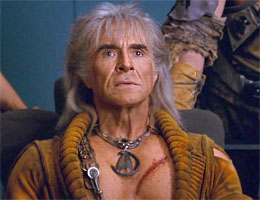 We know that "Star Trek II: The Wrath of Khan" (1982) is the best of all of the "Star Trek" movies. I am not stating anything new here. The rest of the series of films struggled to repeat the mastery of this film, and the reboot has also fallen short, thus far. I did, however, watch "Star Trek II" recently to see if the overlooked "Star Trek: First Contact" was able to take the helm as the Best of the Treks. In the process, however, I realized that "Star Trek II" is a much better movie than I remembered. I invite everyone to watch this movie again to appreciate how great it really is. This is a great movie. It is exciting. It is complex. It is emotional and philosophical. It is one of the great adventure movies.
We know that "Star Trek II: The Wrath of Khan" (1982) is the best of all of the "Star Trek" movies. I am not stating anything new here. The rest of the series of films struggled to repeat the mastery of this film, and the reboot has also fallen short, thus far. I did, however, watch "Star Trek II" recently to see if the overlooked "Star Trek: First Contact" was able to take the helm as the Best of the Treks. In the process, however, I realized that "Star Trek II" is a much better movie than I remembered. I invite everyone to watch this movie again to appreciate how great it really is. This is a great movie. It is exciting. It is complex. It is emotional and philosophical. It is one of the great adventure movies.
There is James T. Kirk's story and the counter-threads. Kirk struggles with his aging in a midlife crisis of sorts. He gets promoted to Admiral, feeling like the detective who gets promoted to a desk job on his way to being forced into retirement. Here, while conducting an inspection of his old Starship Enterprise, he gets pulled into one last adventure. In the process, he revisits elements from his exciting youth. He reunites with his own old crew. But, he also uncovers hidden, forgotten results from his forgotten indiscretions: the tunnel-visioned Khan (Ricardo Montalban) and Kirk's long lost son.

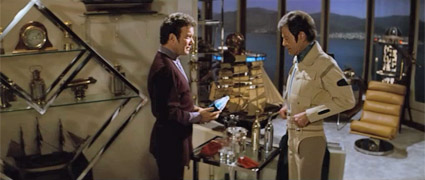

The overall challenge for Kirk, however, is that challenge of facing the impossible no-win situation. In the case of the training exercise, the Kobayashi Maru, he cheats. In the case of his battles against Khan, he keeps pulling tricks from his experienced sleeve. In the end, though, he defeats the no-win situation by the rescue of his best friend's suicide. In the end, he still passes through the no-win situation without truly facing it.
In contrast, Khan makes Kirk his white whale: Moby Dick in the body of a space cowboy. We would think that his superior intellect would diffuse his thirst for vengeance, that vengeance for the brutal death of his wife. But, in film and comics, the tragic flaw of the criminal genius is that he usually succumbs to those base appetites for revenge. The revenge-obsessed criminal might be the staple of 1980s action movies, but along with General Zod in "Superman II" (1980) this Khan is one of Hollywood's most iconic installments. A delicious villain, full of charisma and theatrical flourishes. Perhaps his singular vision was a suicide mission all along: does he have anything to lose or gain, now that his wife is gone? In his final moments, cursing Kirk through Melville, he continues to smile with rage.






On the other hand, we also follow the low-key story of the other of Kirk's sins of youth: his son. David Marcus (Merritt Butrick). Here, we have the tail end of the tale of a son raised by a single mother. He seems to have benefited from the decades of her nurturing, even following in her professional footsteps; meanwhile, he is also the son of a galactic hero who kept his distance. I would have liked more in this story, but there is already so much that is present. As overblown as Khan's story is, David's story is proportionally subtle. His distance from his father seems to inform his short fuse, his resistance against authority (in this case, the self-imposing Star Fleet), and his melee against his father the moment Kirk appears. In the end, however, he comes to terms with his father's choices, and can finally bring himself to accept his father's embrace.
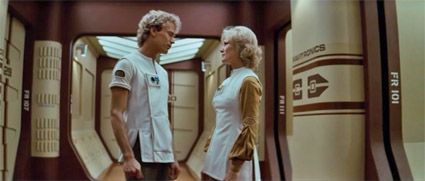

And third, the new lieutenant Saavik (Kirstie Alley) pushes up against Kirk. She is the Vulcan limited by logical thought, struggling to make sense of the passionate, self-contradicting human. She is the feminine female officer in the galaxy of macho male leaders. She is the classic, eager, orderly neophyte who quotes rules and regulations by chapter and verse, bumping heads against the seemingly reckless veteran, who patiently listens to her spew guidelines while guiding her between the lines. I have mentored many young people over the years, and a most difficult lesson for most of them is that you must first learn the rules before you can learn when they do not apply.

And, of course, we have Spock's death. On its own, his "altruistic suicide" seems to be a random turn at the end of the film. But, the line that Spock keeps quoting remedies this seeming contradiction: "The needs of the many outweigh the needs of the few or the one." A few times in the film, he relinquishes his interests for the sake of others. He is the captain of the Enterprise now, but steps back for Kirk not only because it is appropriate and diplomatic, but also because it is Kirk's clear wish to command the ship. At the end, he gives up his life to save the crew and ship. Even then, he maintains a conduct of humility, dignity, and rank.


But what of the Genesis project? The film touches extensively on scientific questions of life. This is 1982, deep in our nuclear fears of the final stretch of the Cold War. Then, we explored the risk of nuclear energy in contrast with the protecting mutual-assured-destruction dangers of nuclear weapons. Near the heart of the story's plot is the Genesis device, which can produce the conditions that lead to life at an accelerated speed. Or, in the wrong hands, the device can be used as a nuclear weapon and destroy worlds. Likewise, we today speak of the Iranians' program for Nuclear energy with public skepticism that they have any goals but WMD, and quiet hopes for more war profiteering in the model of Iraq. In contrast, also, as we speak of our oil depletion, we speak again about Nuclear energy, though we seem remarkably silent about the risks, even with our recent experiences (and consequent silence) with Fukushima. This film reminds me that we need to have more conversations about the Nuclear world.


Or, in terms of ethics, it raises the questions we see in other developments, like Stem Cell research. It is that Frankenstein question: is it ethical to tamper with the construction of life, and what are the unexpected further consequences of doing so? Interestingly, the greatest skeptic pushing the ethical concern is the physician, Bones. Not only is the physician opposing this scientific creation of life, earlier in the film, he breaks the law by smuggling in some illegal liquor. And, more than that, he forgets all of his skepticism when he witnesses the first product of Genesis (in the "Genesis Cave"). But, he is human.
And, through the Genesis project, Kirk faces the big questions of life itself. He begins the film with his birthday, and ends the film with his friend's death. He begins the film with the no-win training exercise, understanding in the end that in escaping the no-win scenario, he is escaping the inevitability of death. But, in quoting Spock, who was quoting Dickens, "A Tale of Two Cities," he speaks of the happiness of the moment over the sorrows of sins from the past, and the hope for a better tomorrow. "It is a far, far better thing that I do, than I have ever done; it is a far, far better rest that I go to than I have ever known." Even in its most empty, most secular approach to life, this reflection speaks of the core of "Star Trek II" - hope above wrath. That hope plays out through the story of young cadets newly exploring the vast world, of the promises of science above its threats, of the persistence of life against the death, of the possibility of love entering a heart of fury, and mostly of the persistence of hope itself even in the no-win situation.

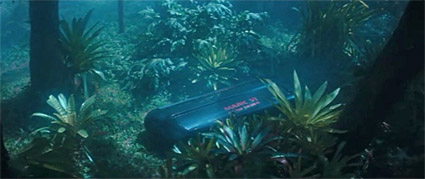

But, beyond the wonderful story, this film succeeds technically. Nicholas Meyer's work as director in composing this film is just amazing. William Paul Dornisch's editing is so good. I did not notice how great his sequences were until this recent viewing. The film is not just one epic adventure; rather, it is a series of smaller adventures, each compartmentalized with its own dramatic steps, while contributing to the larger arc. In one sequence, Khan gives Kirk sixty seconds to hand over secret files. In that time lock, we feel the increasing pressure, as well as repeated moments of verbal combat and humor, leading to a thrilling assault.

Further, James Horner's magnificent score brings a majesty to Space, recalling the great Max Steiner scores of "Gone With the Wind" exploring the South and "The Searchers" exploring the West. On top of that, his specific scoring for the Starship Enterprise makes it seem so magnificent.
On the other hand, the film has its foibles; the caricatures are there. This is the early 1980s. Much American cinema acting still had that artificial staged quality to it, and continued to do so until the end of the decade. Dialogue was still enunciated somewhere between casual street conversation and news broadcast, enunciated enough so that it would sound proper but unnatural. Emotions, even at their most serious moments, were still rather simplified, often unnecessarily amplified. Despite fantastic and exciting special effects, the few hand-to-hand combat scenes looked poorly choreographed, thus sluggish and choppy.
And then, there is Shatner. William Shatner is inseparable not only from James T. Kirk, but from the enjoyable ham that becomes a sort of Kirk-Shatner Matrix. Is there anyone in all of Hollywood who is as inseparable from his most iconic role? Perhaps Christopher Reeve and Superman, or Anthony Perkins and Norman Bates. To lesser degree, perhaps Matthew Broderick and Ferris Bueller. But Kirk-Shatner reaches a different level of heroism that evolves into conscious self-parody.
Here, however, he is handsome with his slender build, curly toupee, and sharp sideburns. In this film, in contrast to almost all of the rest of the Trek movies, he has that confident, charming presence of a Hollywood hero. Yes, we love that moment when the Kirk-Shatner Matrix sits trapped in the belly of a lifeless moon, quaking with fury, releasing the frequently parodied shout, "Khan!" Typing that quote without the necessary 20 letter a's seems to kill its impact. But, this overall edition of Kirk was the best of them all.
On a side note, to truly appreciate the greatness of Shatner, I have to think back to that moment in Jarmusch's "Mystery Train" (1989) when Mitsuko (Youki Kudoh) and Jun (Masatoshi Nagase) page through a photo album full of iconic statues, observing that they all look like Elvis Presley. Similarly, as a Pakistani, I am amazed by how many White men I've met that look like today's Shatner. On a further side note, I'm amazed by how many Saudi male twentysomethings I've met who look like Fernando Valenzuela.
And then there is Ricardo Montalban. He exudes that exotic 1980s Latino masculinity which competed with Omar Shariff and was later taken up by Antonio Banderas. Tall. Dark. Handsome. Chiseled. Thick, whispered accent. He plays Khan Singh; with that name, he is obviously Punjabi though without the requisite Rollie Fingers mustache. I know too many Punjabis who feel that they, like Khan, are of superior intellect; I'm sure that the presence of a Punjabi in the year 2285 will seem appropriate to them. Khan's extensive sighs and need for dramatic lines now seems something more appropriate for off-off-Broadway improv theater, or for Punjabis.
Then, there is Khan's crew. If Ceti Alpha 5 had only two remaining indigenous life forms after the explosion of Ceti Alpha 6 - those very frightening lizards - how did the crew survive? And, for a planet that had so much sand, they seemed not to be covered in it. If I walk a few minutes in sand, my toes cannot seem to get rid of it.


Further, I picture Khan's crew walking around with electric musical instruments. The way they stand, they look like a 1980s big hair Rock and Roll band posing for Annie Leibovitz . They probably provided hair and fashion inspiration for the next decade's music stars, from Robert Plant, to Def Leppard, to Poison, to Motley Crue.
And, then there is Kirstie Alley. We watched her professional life evolve through a process that now seems emblematic of so many Hollywood stars, feeding our base thirst for our own form of vengeance: the implosion of someone once at the center of our attention and admiration. I don't know how low her lows may have been, but now, thirty years later, the amount she enjoys herself seems only surpassed by the amount that George Takei seems to enjoy himself as a King of Facebook.
But, part of the evolution of American cinema is our enjoyment of such caricatures and excesses. In some cases, old movies might seem so dated that we cannot enjoy them. Nevertheless, we have a whole genre of parody films enjoying the caricatures. Here, as is the case with the Kirk-Shatner Matrix, George Takei, and even Montalban in the final years of his career, the exaggerated manners became enjoyable for their exaggerations. I suspect that part of the reason for the enjoyment is that Trekkers tend to have more humor about themselves than the fanboys of Star Wars, Lord of the Rings, and especially the fan-boys of comic books. The latter fan-boys sometimes seem often un-medicated and unhinged.
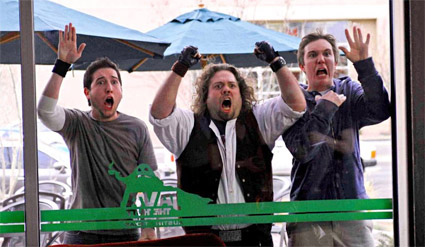
While I am at it, I might as well continue to attract the ire of friendly Trekkers with my ignorance. I do not understand the wisdom of the shape of the Star Ship Enterprise. It seems flimsy. I do not understand the benefit of changing the color of the Enterprise Bridge to reflect the mood of the moment, especially if it means that visibility decreases. I do not know what Spock did to the Warp Drive to get it to work. He seemed to open a lid, stuck his hand in a glowing stew, and closed the lid. Of course, two years earlier, in "The Empire Strikes Back" we watch R2-D2 do the same thing with the Millennium Falcon's hyper-drive by turning some metallic nozzle a few different ways. Maybe it's just one of those things.
All in all, I still have not checked to see if "First Contact" is better than "Star Trek II." That will have to wait for another time. But, now that I watched this film, I'm skeptical that it will catch it.
Omer M. Mozaffar teaches at Loyola University Chicago, where he is the Muslim Chaplain, teaching courses in Theology and Literature. He has given thousands of talks on Islam since 9/11. He is also a Hollywood Technical Consultant for productions on matters related to Islam, Arabs, South Asians.





